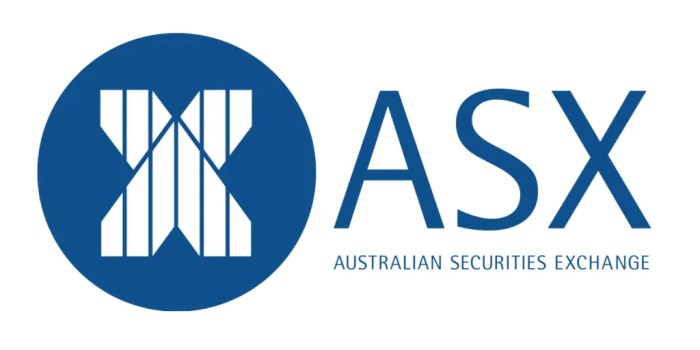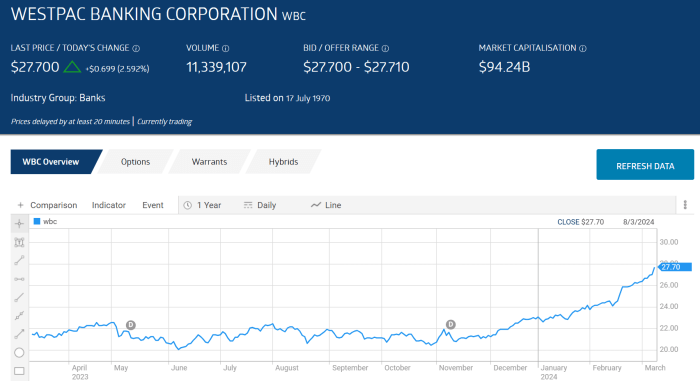Westpac ASX Overview: Investing in Australian Finance Stocks

Delving into the realm of Australian finance stocks, Westpac ASX emerges as a key player worth exploring. This introductory passage sets the stage for a comprehensive look at the intricacies of investing in this sector, promising insights that are both informative and engaging.
The subsequent paragraphs will delve deeper into the history, core business areas, financial performance, risk analysis, and regulatory environment of Westpac ASX, offering a holistic view for potential investors.
Overview of Westpac ASX
Westpac Banking Corporation, commonly known as Westpac, is one of Australia's "big four" banks and a significant player in the finance sector. Established in 1817, Westpac is the oldest bank in Australia and has a rich history of serving customers for over two centuries.
Brief History of Westpac ASX
- Founded in 1817 as the Bank of New South Wales.
- Renamed Westpac Banking Corporation in 1982.
- Expanded internationally with operations in New Zealand, Asia, and the Pacific region.
Core Business Areas of Westpac ASX
- Retail Banking: Providing banking services to individual customers.
- Business Banking: Catering to the financial needs of small, medium, and large businesses.
- Wealth Management: Offering investment and wealth management services to clients.
Significance of Westpac ASX in the Australian Finance Sector
Westpac ASX holds a prominent position in the Australian finance sector due to its extensive network, diverse range of financial products and services, and long-standing reputation. As one of the largest banks in Australia, Westpac plays a crucial role in shaping the country's economy and financial landscape.
Investing in Australian Finance Stocks
Investing in Australian finance stocks can be a lucrative opportunity for investors looking to diversify their portfolio and tap into the stability of the financial sector. Australian finance stocks are known for their resilience and consistent returns, making them attractive to both novice and seasoned investors.
Comparison with Other Key Players
When comparing Westpac ASX with other key players in the Australian finance market, it's essential to consider factors such as market capitalization, financial performance, and growth prospects. While Westpac ASX is one of the largest banks in Australia, competitors like Commonwealth Bank and ANZ Bank also hold significant market share and offer unique investment opportunities.
Tips for Successful Investing
- Diversify your portfolio: Spread your investments across different finance stocks to mitigate risk and maximize returns.
- Research and analysis: Conduct thorough research on the financial health and performance of potential investments before making any decisions.
- Stay updated: Keep abreast of market trends, economic indicators, and regulatory changes that may impact the finance sector.
- Long-term perspective: Adopt a long-term investment strategy to weather market fluctuations and capitalize on the growth potential of Australian finance stocks.
- Consult with financial advisors: Seek advice from professionals to tailor your investment strategy to your financial goals and risk tolerance.
Financial Performance of Westpac ASX
Investors looking to evaluate Westpac ASX should consider various key financial metrics and recent trends that impact its performance.
Key Financial Metrics
- Revenue: Westpac's total revenue for the past fiscal year was $39.4 billion, showcasing the company's earning capacity.
- Net Income: The net income of Westpac stood at $6.8 billion, indicating its profitability.
- Return on Equity (ROE): With an ROE of 9.5%, investors can gauge how effectively Westpac is utilizing shareholders' equity.
- Asset Quality: The non-performing loan ratio of 1.23% reflects the quality of Westpac's loan portfolio.
Recent Trends and Developments
- Impact of COVID-19: The pandemic has led to an increase in loan provisions and a decrease in demand for loans, affecting Westpac's financial performance.
- Digital Transformation: Westpac's focus on digital banking services has improved efficiency and customer experience, potentially boosting its financial performance in the long run.
- Regulatory Changes: Recent regulatory changes in the financial sector could impact Westpac's profitability and operations, influencing its financial performance outlook.
Risk Analysis and Mitigation Strategies

Investing in Australian finance stocks, such as Westpac ASX, comes with its own set of risks that investors need to be aware of. These risks can include market volatility, regulatory changes, economic downturns, and company-specific risks.
Potential Risks Associated with Investing in Australian Finance Stocks
- Market Volatility: The stock prices of financial companies can be sensitive to market fluctuations, which can lead to significant price swings.
- Regulatory Changes: Changes in regulations or government policies can impact the operations and profitability of financial institutions.
- Economic Downturns: During economic downturns, financial companies may face challenges such as loan defaults, reduced consumer spending, and lower interest rates.
- Company-Specific Risks: Factors such as poor management decisions, legal issues, or competitive pressures can also affect the performance of a specific financial stock.
Mitigation Strategies when Investing in Westpac ASX
- Diversification: By spreading your investments across different sectors and asset classes, you can reduce the impact of any one stock's performance on your overall portfolio.
- Thorough Research: Conducting due diligence on Westpac ASX, including analyzing its financial statements, management team, and competitive position, can help you make informed investment decisions.
- Setting Stop-Loss Orders: Setting stop-loss orders can help limit potential losses by automatically selling a stock if it reaches a predetermined price level.
- Monitoring Economic Indicators: Keeping an eye on economic indicators such as interest rates, inflation, and GDP growth can help you anticipate potential risks to Westpac ASX.
Impact of Geopolitical or Economic Factors on Risk Profile of Westpac ASX
- Geopolitical Tensions: Events such as trade wars, political instability, or international conflicts can impact the global economy and financial markets, affecting the risk profile of Westpac ASX.
- Interest Rate Changes: Changes in interest rates by central banks can influence borrowing costs, consumer spending, and the profitability of financial institutions like Westpac ASX.
- Global Economic Conditions: Economic conditions in key markets where Westpac operates can also influence its risk profile, including factors like exchange rates, trade agreements, and regulatory environments.
Regulatory Environment and Compliance
Understanding the regulatory landscape governing Australian finance stocks is crucial for investors looking to assess the stability and compliance of companies like Westpac ASX. Let's delve into how Westpac ASX navigates this complex regulatory environment.
Regulatory Requirements for Australian Finance Stocks
Australian finance stocks operate within a stringent regulatory framework overseen by regulatory bodies such as the Australian Securities and Investments Commission (ASIC) and the Australian Prudential Regulation Authority (APRA). These regulations aim to ensure transparency, stability, and investor protection within the financial sector.
- Westpac ASX complies with these regulatory requirements by regularly reporting financial data, adhering to capital adequacy ratios, and implementing risk management practices to safeguard against market volatility.
- Furthermore, Westpac ASX engages in ethical and responsible banking practices to maintain compliance with anti-money laundering (AML) and counter-terrorism financing (CTF) laws.
Recent Regulatory Changes Impacting Westpac ASX
In recent years, the Australian financial sector has witnessed significant regulatory changes aimed at enhancing transparency and accountability. One notable change impacting Westpac ASX is the Banking Executive Accountability Regime (BEAR), which holds senior executives personally accountable for misconduct within their institutions.
These regulatory changes have prompted Westpac ASX to strengthen its governance structures, risk management processes, and compliance mechanisms to align with evolving regulatory standards.
Summary

In conclusion, the journey through Westpac ASX Overview: Investing in Australian Finance Stocks unveils the multifaceted landscape of this financial giant and the lucrative opportunities it presents to savvy investors. Whether you're a seasoned player in the finance market or a newcomer looking to make informed decisions, this overview equips you with the knowledge needed to navigate this dynamic sector with confidence.
FAQ Guide
What are the benefits of investing in Australian finance stocks?
Investing in Australian finance stocks can offer diversification, exposure to a stable economy, and potential for growth compared to other markets.
How does Westpac ASX comply with regulatory requirements?
Westpac ASX adheres to stringent regulatory standards set by Australian authorities, ensuring transparency and accountability in its operations.
What are some key financial metrics to consider when evaluating Westpac ASX?
Investors should focus on metrics like return on equity, net interest margin, and non-performing loans to gauge the financial health of Westpac ASX.

